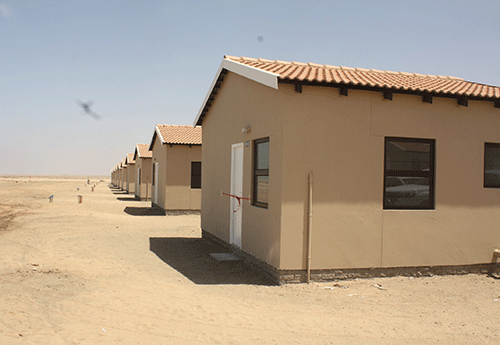Beyond its elemental function as shelter, housing transcends physical and mental health, economic stability, social cohesion and community development, Landless People’s Movement legislator Utaara Mootu has said.
While motivating her motion on sustainable housing in the National Assembly this week, she added that the right to housing is clearly supported by international law.
Mootu said housing, as the very foundation of the international human rights system in the Universal Declaration of Human Rights, ensures that the right to adequate housing is safe, secure, affordable and must primarily provide freedom from eviction.
“Housing is an anchor in the framework of societal well-being, constituting a foundational pillar that influences various facets of human life,” she noted, buttressing the drastic need to redefine the provision of housing as social justice, as enshrined in the supreme law of the land.
Statistics by the young lawmaker posit a picture of a Namibian House grappling with high inequality, with the average household income in 2014 marked at N$6 626, with 91.1% of the surveyed households falling under the average income bracket, according to the Namibia Statistics Agency.
Mootu said the main factor leading to the housing shortage is that demand outstrips the supply, exacerbated by a high unemployment rate, rising housing prices and growing urbanisation, which result in the proliferation of informal settlements.
“Currently, the policy is mirrored to fit the urban more than the rural set-up. For instance, no housing scheme is available to allow rural communities access to build decent houses on credit schemes. Elderly applicants via the Build Together programme are required to apply with a co-applicant, with an income threshold of N$100 – N$3 000.
This neo-liberal approach excludes the masses and lacks the capacity to foster rural transformation,” the LPM firebrand stressed.
Meanwhile, the National Planning Commission states that the housing sector in Namibia is segmented into three broad categories, namely ultra-low and low-income-earners (blue-collar workers); middle-income-earners (white-collar workers); and the upper class (rich and the super-rich).
The latter is not experiencing problems in acquiring houses, as they are capable of providing collateral or have the means to purchase houses, the commission added.
The middle-income earners are in three sub-categories, namely the low, lower-middle and upper-middle spheres.
Mootu observed that rural infrastructure development is at a snail’s pace, and unable to curb increasing rural-urban migration rates.
As such, there is an urgent call for the amendment of existing housing programmes, or to introduce a separate rural housing policy.
“The lack of access to mortgages is a core problem to the backlog in the country, and banks must be regulated strictly on home loans granted at high interest rates, especially for first-time homeowners.
It can be inferred that developers are capitalising on the exclusion of these demographic segments by disregarding the need for more affordable housing options.
Furthermore, financial institutions should proactively collaborate with governments to explore viable strategies for integrating these underserved communities,” she said.
A frustrated Mootu noted that there are a range of alternatives available to financing housing, such as microfinancing, which are short-term loans, but are more expensive and have higher interest rates.
“Pooling savings is another progressive community-based network of housing savings schemes, but the financial tool with more potential due to provision longevity is the pension fund. On the contrary, there are greater limitations as the government uses the pension fund to
finance expenditure, and may not allow access to finance housing,” she pointed, adding that this should be criticised as the government controls the financial freedom of individuals regarding their pensions.


